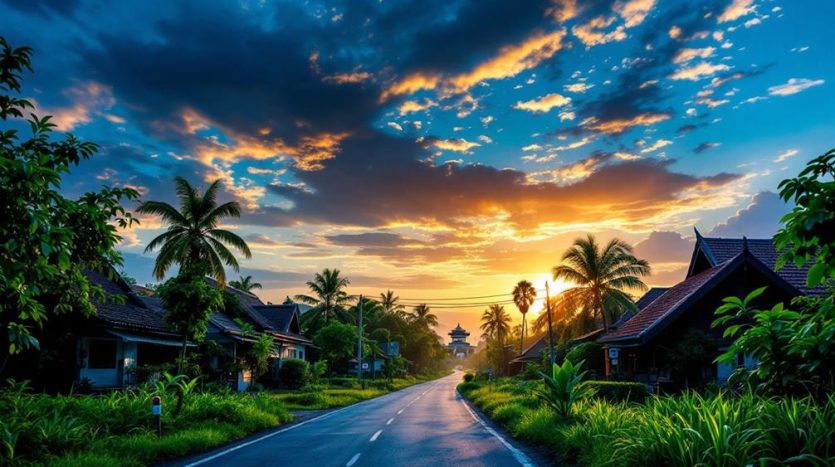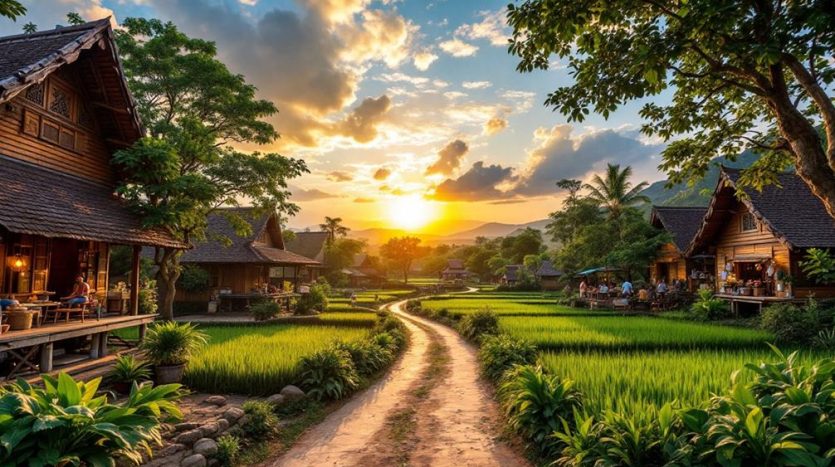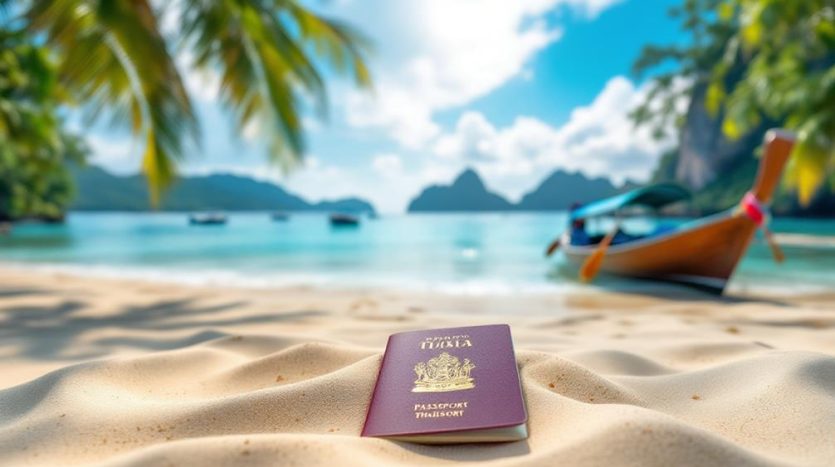Is It Safe to Retire in Thailand?
When considering retirement in Thailand, you'll find a mix of appealing factors and potential challenges. The lower cost of living and vibrant expat community might draw you in, but questions about the healthcare system and visa requirements could give you pause. Thailand's crime rates are generally low, yet understanding local customs is key for personal safety. The political climate seems stable now, but how might it impact your peaceful lifestyle in the future? And let's not overlook cultural adaptation—how easy is it to truly feel at home? Each aspect deserves a closer look before you make a decision.
Key Takeaways
- Thailand's crime rates are lower than many Western countries, providing a safer environment for retirees.
- High-quality healthcare facilities in urban areas ensure accessible and affordable medical services for expats.
- Government initiatives, like community policing and tourist police, enhance safety for residents and visitors.
- Political stability has improved recently, but staying informed about local news remains important.
- Engaging in local communities and respecting cultural norms can enhance personal safety and integration.
Cost of Living

When considering retirement in Thailand, understanding the cost of living is essential. Crafting a retirement budget involves more than just counting your baht, though that's a good start.
Lifestyle choices play a huge role. Do you envision yourself sipping piña coladas by the beach, or are you more of a "local markets and street food" type? Street food isn't only delicious but also budget-friendly, allowing you to enjoy local flavors without straining your budget.
Either way, knowing your food prices and entertainment expenses will help you avoid turning your golden years into ramen noodle years.
Expat communities can provide insight into the financial planning maze, offering tips on maneuvering currency exchange and stretching your retirement dollars further than a tuk-tuk ride.
Transportation options are plentiful, from budget-friendly public transit to the more adventurous motorbike rentals—just remember, insurance first, daredevil second.
Leisure activities are abundant, and they don't have to break the bank. Whether you're exploring temples or attending local festivals, there's plenty to do without emptying your wallet.
Balance is key; too much splurging, and you might find yourself moonlighting as a tour guide.
Healthcare System
When considering retirement in Thailand, you'll find the healthcare system offers a mix of high-quality medical facilities, especially in urban areas.
Accessibility to health services is generally good, but it can vary considerably between cities and rural regions.
Additionally, certain expat communities provide easier access to healthcare services tailored to foreigners.
The cost of medical care is relatively affordable compared to Western standards, though it's important to evaluate insurance options to guarantee thorough coverage.
Quality of Medical Facilities
Thailand's healthcare system is a significant consideration for retirees contemplating a move to this Southeast Asian nation. You're probably wondering if the medical facilities are up to scratch or if you'll need to pack a first aid kit the size of your suitcase. Fear not, because Thailand boasts hospitals that are not only equipped with advanced medical technology but also receive glowing patient reviews.
| Feature | Description |
|---|---|
| Medical Technology | State-of-the-art equipment and procedures |
| Patient Reviews | Generally positive, with high satisfaction rates |
| Staff Qualifications | Many doctors are trained internationally |
| Facility Cleanliness | Comparable to Western standards |
The shiny gadgets you find in Thai hospitals rival those in Western countries. You'll find doctors who speak fluent English—not just fluent in prescribing medication. Patient reviews often highlight the friendly staff and the surprisingly affordable costs. It's like getting a five-star hotel service at a three-star price.
Accessibility of Health Services
While it's reassuring to know that Thai hospitals are well-equipped and receive positive reviews, understanding how easily you can access these healthcare services is equally important.
Consider this: you're in a picturesque Thai village, sipping coconut water, and suddenly, you need medical advice. No worries! Thailand's healthcare accessibility is as accommodating as your favorite pair of stretchy pants after a big meal.
In urban areas, hospitals and clinics are as plentiful as tuk-tuks on the streets, ensuring you won't have to go far for medical attention.
However, if your retirement dream involves rural serenity, fear not. Rural accessibility is improving, with healthcare facilities popping up like mushrooms after rain.
And for those truly "off the beaten path" moments, telemedicine options are a game-changer. You can consult doctors online, saving you the trek through rice paddies to the nearest clinic.
But let's be real, not every village doctor is equipped with the latest tech. So, having a backup plan for more serious issues, like a quick trip to a city hospital, is wise.
Cost of Medical Care
Understanding the cost of medical care in Thailand is essential for anyone planning to retire there. You don't want to spend your golden years fretting over hospital bills instead of lounging on a beach.
Thailand's medical tourism industry can be a double-edged sword: high-quality care at affordable prices, but it still requires some financial navigation. The good news is that healthcare costs in Thailand are generally lower than in Western countries, but those savings can quickly evaporate if you don't have a solid plan.
Insurance options are plentiful, but they can be as confusing as trying to order Thai food without a menu. You might opt for international health insurance, which covers you globally, or dip your toes into local insurance plans that focus on Thai facilities.
Either way, you'll want to read the fine print to avoid any surprising exclusions that could turn your trip to the doctor into an unexpected adventure.
In the domain of medical tourism, Thailand's private hospitals often resemble five-star hotels, offering world-class care at a fraction of the cost.
Crime Rates
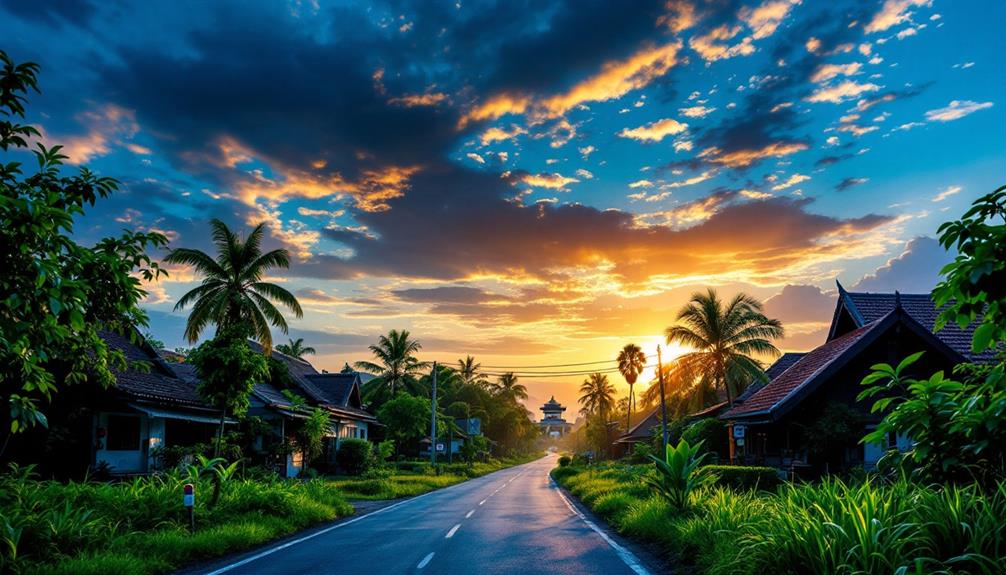
When evaluating Thailand's crime rates, you'll find they're generally lower than many Western countries, but it's essential to remain aware of your surroundings.
As an expat, adopting safety tips like avoiding isolated areas and securing your belongings can greatly reduce any risks.
The Thai government actively implements initiatives to enhance public safety, including measures to support foreign ownership regulations, reflecting its commitment to a secure environment for both residents and retirees.
Comparing Thailand's Crime Statistics
In light of concerns about safety, comparing Thailand's crime rates with those of other countries can provide valuable insights for potential retirees. Thailand's crime trends show a relatively moderate level of crime, especially when compared to western countries where sensational headlines are practically an art form.
However, local perceptions often paint a rosier picture; many Thai residents report feeling safe in their communities, a sentiment you might share once you've navigated the bustling streets without losing your wallet.
You'll want to reflect on these points when mulling over your retirement plans:
- Petty theft: More common in tourist areas, but who can resist the allure of a fanny pack?
- Violent crime: Lower than in many western nations, though the occasional tuk-tuk ride might test your heart rate.
- Scams: A global phenomenon, but here they come with a smile and a side of pad Thai.
While Thailand's crime statistics offer a mixed bag, they suggest a generally safe environment, provided you exercise the usual caution.
Safety Tips for Expats
Having considered Thailand's crime statistics, let's explore how expats can enhance their safety while enjoying life in this vibrant country.
First things first, don't be a hermit—get involved in community activities. Not only will you gain a network of friends who know the ins and outs of local living, but you'll also have extra sets of eyes looking out for you. It's like having your own personal safety squad, minus the superhero capes.
Now, let's talk about personal safety. While it's tempting to flaunt your bling, remember that less is more. Consider leaving your diamond tiara at home, or at least save it for special occasions. Instead, blend in with the local style and keep valuables discreetly tucked away. After all, nothing says "rob me" quite like waving cash in the air.
Also, trust your instincts. If a situation feels off, it probably is. Don't be afraid to politely decline an invitation or dodge a sketchy alleyway.
Government Initiatives on Safety
Thailand's government has implemented several initiatives to guarantee safety and reduce crime rates, making it a more appealing destination for expats.
Through a mix of safety regulations and government programs, you can rest assured knowing they're taking steps to make certain your golden years are more about sipping coconuts than dodging pickpockets.
The government's approach is both thorough and occasionally amusing, like conducting annual crime prevention workshops that may or may not include role-play scenarios involving overly polite criminals.
Here's a snapshot of some key initiatives:
- Community Policing: Encouraging locals to work with police to monitor neighborhoods, making even the most notorious alley as safe as a Sunday stroll.
- Tourist Police: A specialized force trained to assist foreigners, ensuring you get help faster than you can say "sawasdee" (hello).
- CCTV Expansion: Increasing the number of cameras in public areas, because who doesn't want to be the star of their own reality show?
While serious about crime reduction, these programs also reflect a unique blend of efficiency and cultural charm.
Political Stability
How essential is political stability when considering retirement in Thailand? Well, unless you're planning to retire as a secret agent, a stable political climate is pretty important. Thailand's political scene has had its share of ups and downs, much like a rollercoaster, but without the safety harness.
For you, as a retiree, the focus is more about sipping cocktails than staging coups, so understanding the political climate is key. Expat opinions vary, but many agree that despite occasional political hiccups, life remains relatively undisturbed for those living outside the epicenter of political turmoil. It's like watching a soap opera from the comfort of your couch—dramatic but not directly affecting your daily life.
In recent years, Thailand has shown efforts to stabilize its political environment, making it more predictable for those considering relocation. However, don't toss your emergency evacuation plan just yet. It's wise to keep an eye on local news and international updates.
Political stability in Thailand can sometimes feel like a dance, where the steps aren't always clear, but the show somehow goes on. So, while you're packing for Thailand, maybe pack a sense of humor too. It'll come in handy!
Cultural Adaptation
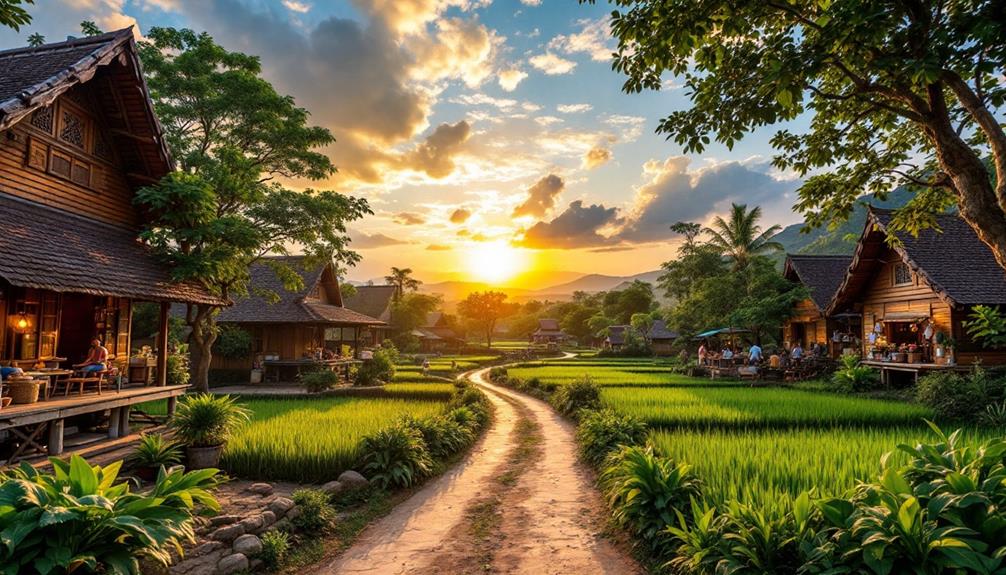
Adjusting to a new culture is an integral part of retiring in Thailand. Imagine a place where smiling is practically a national pastime and the word "mai pen rai" (meaning "no worries") is used more than "hello."
But let's not sugarcoat it—navigating cultural norms and language barriers can feel like trying to find Wi-Fi in the middle of the jungle. Yes, you might inadvertently turn a friendly wave into a declaration of war with the wrong hand gesture—oops!
Whether you choose to live in urban areas like Bangkok or in the serene rural regions, adapting to the local lifestyle will be essential.
To ease your adjustment, consider:
- Language Learning: Mastering basic Thai phrases can break down those pesky language barriers and earn you brownie points with locals.
- Respecting Traditions: Always remove your shoes before entering a home. It's not just polite—it's a cultural norm.
- Understanding Social Hierarchies: Age and status matter. Respect elders and you'll be golden.
While adapting, keep a sense of humor. You may find yourself in hilarious situations, like mistakenly ordering five bowls of soup because you mixed up "five" and "spicy."
But with time, patience, and a willingness to learn, you'll not only adapt but thrive in Thailand. Enjoy the adventure!
Housing Options
When considering housing options in Thailand, it's crucial to evaluate both urban and rural settings to find what suits your retirement lifestyle best.
Do you dream of waking up in a beachfront condo, where you can sip your morning coffee while contemplating the waves and inevitable sandcastle mishaps?
Or perhaps you'd prefer the serenity of rural villas, where the loudest sound is a rooster with a questionable sense of time?
If you're more of a city slicker, urban apartments offer the convenience of being near all the action—markets, street food, and maybe the occasional elephant parade.
For those who value security and community, gated communities provide peace of mind, and an opportunity to perfect your fence-gazing skills.
Retirement villages are another option, offering a ready-made social circle and activities that make bingo look like an extreme sport.
Meanwhile, if luxury homes are more your style, Thailand's upscale neighborhoods offer not just opulence, but the chance to say, "Oh, this old thing?" when showing off your abode.
Ultimately, Thailand's diverse housing options cater to every retiree's taste, ensuring your golden years are as adventurous or relaxed as you desire.
Visa Requirements
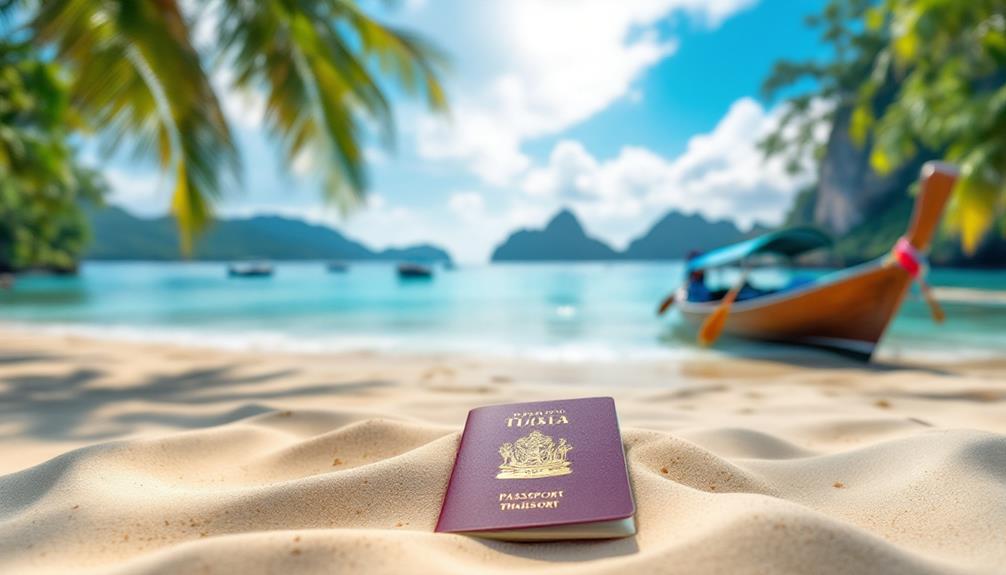
Maneuvering Thailand's visa requirements is an essential step in planning for retirement in this Southeast Asian paradise. While it's not exactly akin to deciphering ancient hieroglyphics, understanding the options can feel like it.
So, let's break it down for you: acquiring a retirement visa or securing long-term residency will be your key focus.
To retire in Thailand, you've got a few options. Consider the following:
- Retirement Visa (O-A): This is for those 50 or older, valid for a year. Bonus: it's renewable annually. Just make sure your bank account doesn't resemble Mother Hubbard's cupboard.
- Retirement Visa (O-X): If you're keen on avoiding annual renewals, this 10-year option is for you, provided you meet the financial criteria that would make Scrooge McDuck proud.
- Elite Visa: Think of this as the VIP pass to Thai residency. Pay a hefty fee, and enjoy long-term residency without jumping through annual hoops.
While steering through these options, remember to keep your financials in check and your patience running high.
After all, bureaucracy can be as thrilling as watching paint dry, but it's worth it for a slice of paradise.
Natural Disasters
Concerning natural disasters, Thailand poses certain risks that potential retirees should consider. It's not all sunshine and mango sticky rice. You'll need to keep an eye out for earthquake preparedness, as minor tremors do happen, especially in the northern regions. But don't worry; unless you're planning to retire inside a Jenga tower, you're probably safe.
Flood risks are more pressing, particularly during the rainy season, which can turn streets into rivers faster than you can say "rubber ducky." Coastal areas and Bangkok are the usual suspects, so it's wise to scout for higher ground or stock up on floaties.
| Natural Disaster | Risk Level |
|---|---|
| Earthquakes | Low |
| Floods | Moderate |
| Hurricanes | Low |
| Tsunamis | Low |
| Landslides | Moderate |
Hurricane seasons don't typically affect Thailand, but when they do, it's like a surprise party you didn't RSVP for—unexpected and slightly dampening. Rest assured, emergency services are well-equipped, turning chaos into order with a level of efficiency that would make Marie Kondo proud. So, while nature might throw a tantrum now and then, a little preparedness goes a long way.


